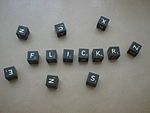 As you may know from my Nim posts, I'm fond of games that can be analyzed to assure an advantage over someone.
As you may know from my Nim posts, I'm fond of games that can be analyzed to assure an advantage over someone.
Instead of yet another version of Nim, however, today we're going to look at another classic game, known as GHOST. It's a verbal word game, so the only item needed is some sort of resource, such as a dictionary, which will dictate which words are legal, and which words are not.
There are several variations of GHOST, but I'll only be focusing on the classic version of the game. In order to assure an advantage, I'll also only be focusing on a game with 2 players in American English.
Here are the rules of GHOST that apply to our 2-player game, as explained on Wikipedia's GHOST (game) page:
A player is chosen at random to start the game, and begins by naming any letter of the alphabet. Players then take turns to add letters to this fragment, with the aim being to avoid completing an actual word. The player whose turn it is may - instead of adding a letter - challenge the previous player to prove that the current fragment is actually the beginning of a word. If the challenged player can name such a word, the challenger loses the round; otherwise the challenged player loses the round. If a player bluffs, or completes a word without other players noticing, then play continues. When a round ends, play generally passes to the left.It's easy to see how Nim can be analyzed mathematically, but how is a game like this possible to analyze when we're restricted to words of a given language?
If any score is kept at all, the traditional method uses the letters of the word "Ghost" in the same fashion as the basketball game horse, with each loss giving the player the next letter of the word, and a player being eliminated when they have all five letters.
In a 2-player game, the first player can win by forcing the 2nd player to complete a word with an even number of letters. Similarly, the second player can win by forcing the 1st player to complete a word with an odd number of letters.
As I mentioned above, there must be some sort of reference book used as the standard for legitimate words. Traditionally, when playing this game, you'd carry around a dictionary. Today, it's easier to play with a reference which is accessible from a mobile device. Over in zyzzyva.net's word list page, there are several good word lists, with definitions, that will work for this. For reasons that will be explained later, I highly recommend the Official Scrabble Player's Dictionary 4 list.
Once you have a standardized list, it's possible to work out your best strategies. How? Basically, you're looking for letter combinations that limit the choices to only odd (for strategies where you're the 2nd player) or only even choices (for strategies where you're the 1st player).
This basic idea was first discussed in Word Ways in the early 1970s in a piece titled “Our Move”. It was written about again, in “Pocket Ghost”, but the most impressive work done was by Alan Frank in 1987, using the Official Scrabble Player's Dictionary (OSPD), in “Ghostbusted”.
Alan Frank's usage of the OSPD is why I recommended that particular word list link above. Do note that Mr. Frank considered words from there that only used up to 9 letters, while the linked word list included words up to 15 letters. You'll probably want to either verify that the strategies still work with the OSPD4 list and/or whittle down the list to insure your advantage. If you do the latter, you'll obviously need to store it somewhere on the web, and give it an easy-to-type and easy-to-remember link.
Once you have a set of words with which you're comfortable, how do you access them? Not surprisingly, I advocate memorizing the needed words. This sounds like plenty of work, but if you use the Link System, as taught in these videos, and memorize the words in order from shorter to longer, then the process can be more fun than you probably thought.
Challenge yourself to win, and then challenge your friends. If you've found any resources that aid in winning at GHOST, I'd love to hear about it in the comments!




No Response to "GHOST Busting"
Post a Comment